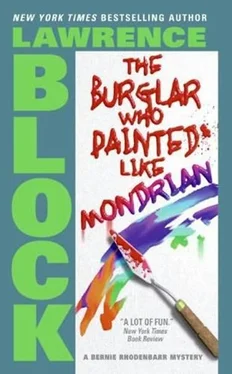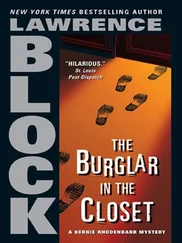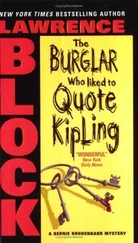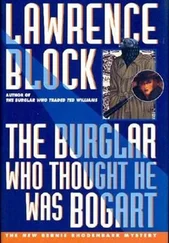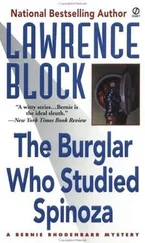I said, “Michael Turnquist?”
“Speaking.”
“Sorry,” I said. “I must have the wrong number.”
The hell with it. I picked up the phone again and dialed 911. When a woman answered I said, “There’s a dead body at a construction site on Washington Street,” and gave the precise address. She started to ask me something but I didn’t let her finish her sentence. “Sorry,” I said, “but I’m one of those people who just don’t want to get involved.”
I was lost in something, possibly thought, when a key turned in one of the locks. The sound was repeated as someone opened the other two locks in turn, and I spent a couple of seconds trying to decide what I’d do if it wasn’t Carolyn. Suppose it was the Nazi, coming to swipe the other cat. I looked around for Ubi but didn’t see him, and then the door swung inward and I turned to look at Carolyn and Elspeth Peters.
Except it wasn’t Elspeth Peters, and all it took was a second glance to make that clear to me. But I could see why my henchperson had taken a second glance at the Peters woman, because the resemblance was pronounced.
I could also see why she’d taken more than a couple glances at this woman, who obviously had to be Alison the tax planner. She was at least as attractive as Elspeth Peters, and the airy quality of Ms. Peters that went so well with old-timey lady poets and secondhand books was replaced in Alison by an earthy intensity. Carolyn introduced us-“Alison, this is Bernie Rhodenbarr. Bernie, this is Alison Warren”-and Alison established her credentials as a political and economic lesbian with a firm no-nonsense handshake.
“I didn’t expect you,” Carolyn said.
“Well, I stopped in to use the shower.”
“Right, you were running.”
“Oh, you’re a runner?” Alison said.
We got a little mileage out of that, so to speak, and Carolyn put some coffee on, and Alison sat down on the couch and Ubi turned up and sat in her lap. I went over to the stove, where Carolyn was fussing with the coffee.
“Isn’t she nice?” she whispered.
“She’s terrific,” I whispered back. “Get rid of her.”
“You’ve got to be kidding.”
“Nope.”
“Why, for Christ’s sake?”
“We’re going to the museum. The Hewlett.”
“Now?”
“Now.”
“Look, I just got her here. She’s all settled in with a cat on her lap. The least I can do is give her a cup of coffee.”
“Okay,” I said, still whispering. “I’ll split now. Get away as soon as you can and meet me in front of the Hewlett.”
When I handed over my two singles and two quarters, the attendant at the Hewlett was nice enough to point out that the gallery would be closing in less than an hour. I told him that was all right and accepted my lapel pin in return. The whole exchange brought the late Mr. Turnquist to life for me, and I remembered the fierce animation with which he’d lectured to us about art. I suppose I’d depersonalized the man in order to drag his body across town and dump him, and I guess it had been necessary, but now I saw him again as a person-quirky and abrasive and vividly human-and I felt sorry he was dead and sorrier that I’d used him after death as a prop in a macabre farce.
The feeling was a dismal one and I shook it off as I made my way to the upstairs gallery where the Mondrian was on display. I entered with a perfunctory nod at the uniformed guard. I half expected to find a blank spot on the wall where Composition with Color had lately hung, or another painting altogether, but Mondrian was right where he belonged and I was glad to see him again.
Half an hour later a voice at my elbow said, “Well, it’s good, Bernie, but I don’t think it would fool many people. It’s hard to make a pencil sketch look like an oil painting. What are you doing?”
“Sketching the painting,” I said, without looking up from my notebook. “I’m guessing at the measurements.”
“What are the initials for? Oh, the colors, right?”
“Right.”
“What’s the point?”
“I don’t know.”
“The guy downstairs didn’t want to take my money. The place is gonna close any minute. What I did, I gave him a dollar. Are we gonna steal the painting, Bernie?”
“Yes.”
“Now?”
“Of course not.”
“Oh. When?”
“I don’t know.”
“I don’t suppose you know how we’re gonna do it, either.”
“I’m working on it.”
“By drawing in your notebook?”
“Shit,” I said, and closed the notebook with a snap. “Let’s get out of here.”
“I’m sorry, Bern. I didn’t mean to hassle you.”
“It’s okay. Let’s get out of here.”
We found a bar called Gloryosky’s a couple of blocks up Madison. Soft lighting, deep carpet, chrome and black formica, and some Little Orphan Annie murals on the walls. About half the patrons were gulping their first après-work drinks while the rest looked as though they hadn’t made it back from lunch. Everybody was thanking God that it was Friday.
“This is nice,” Carolyn said as we settled into a booth. “Dim lights, gaiety, laughter, the clink of ice cubes and a Peggy Lee record on the jukebox. I could be happy here, Bernie.”
“Cute waitress, too.”
“I noticed. This joint has it all over the Bum Rap. It’s a shame it’s so far from the store.” The waitress appeared and leaned forward impressively. Carolyn gave her a full-tilt smile and ordered a martini, very cold, very dry, and very soon. I asked for Coca-Cola and lemon. The waitress smiled and departed.
“Why?” Carolyn demanded.
“Pardon?”
“Why Coke with lemon?”
“It cuts some of the sugary taste.”
“Why Coke in the first place?”
I shrugged. “Oh, I don’t know. I guess I’m not in the mood for Perrier. Plus I figure I can use a little sugar rush and a caffeine hit.”
“ Bern, are you being willfully obtuse?”
“Huh? Oh. Why no booze?”
“Right.”
I shrugged again. “No particular reason.”
“You’re gonna try breaking into the museum? That’s crazy.”
“I know, and I’m not going to try. But whatever I do I’ve got a complicated evening coming up and I guess I want to be at the top of my form. Such as it is.”
“Myself, I figure I’m better with a couple of drinks.”
“Maybe you are.”
“Not to mention the fact that I couldn’t survive another ten minutes without one. Ah, here we are,” she said, as our drinks appeared. “You can tell him to start mixing up another of these,” she told the waitress, “because I wouldn’t want to get too far out in front of him.”
“Another round.”
“Just another martini,” she said. “He’s got to sip that. Didn’t your mother ever tell you? Never gulp anything fizzy.”
I squeezed the lemon into the Coke, stirred and sipped. “She’s got a great laugh,” Carolyn said. “I like a girl with a nice sense of humor.”
“And a nice set of-”
“Those too. There’s a lot to be said for curves, even if your buddy Mondrian didn’t believe in them. Straight lines and primary colors. You think he was a genius?”
“Probably.”
“Whatever genius is. As far as having something to hang on the wall, I’m a lot happier with my Chagall litho.”
“That’s funny.”
“What is?”
“Before,” I said. “Standing in front of the painting, I was thinking how great it would look in my apartment.”
“Where?”
“Over the couch. Sort of centered over the couch.”
“Oh yeah?” She closed her eyes, trying to picture it. “The painting we just saw? Or the one you saw in Onderdonk’s apartment?”
“Well, the one we just saw. But the other was the same idea and the same general proportions, so it would do, too.”
Читать дальше
